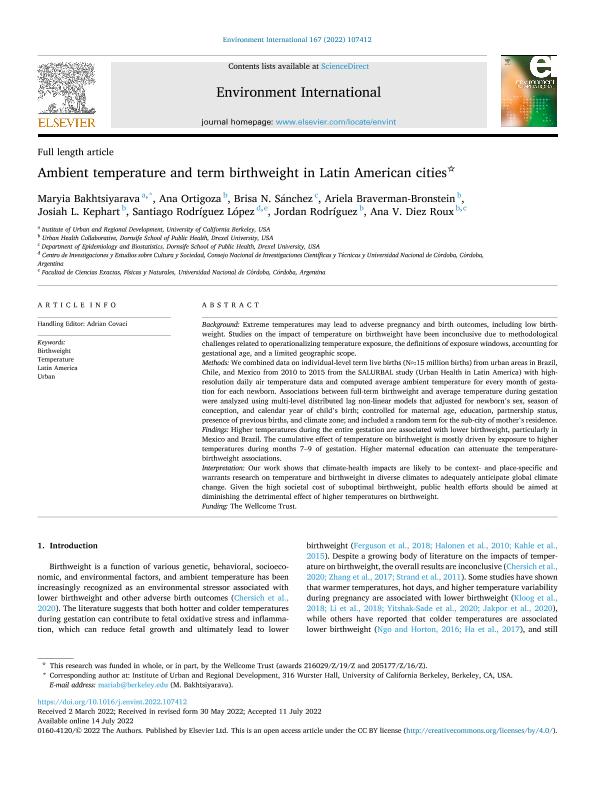Mostrar el registro sencillo del ítem
dc.contributor.author
Bakhtsiyarava, Maryia
dc.contributor.author
Ortigoza, Ana
dc.contributor.author
Sánchez, Brisa
dc.contributor.author
Braverman, Ariela
dc.contributor.author
Kephart, Josiah
dc.contributor.author
Rodríguez López, Santiago

dc.contributor.author
Rodriguez Hernandez, Jordan
dc.contributor.author
Diez Roux, Ana Victoria

dc.date.available
2023-09-20T14:04:02Z
dc.date.issued
2022-09
dc.identifier.citation
Bakhtsiyarava, Maryia; Ortigoza, Ana; Sánchez, Brisa; Braverman, Ariela; Kephart, Josiah; et al.; Ambient temperature and term birthweight in Latin American cities; Pergamon-Elsevier Science Ltd; Environment International; 167; 9-2022; 1-11
dc.identifier.issn
0160-4120
dc.identifier.uri
http://hdl.handle.net/11336/212281
dc.description.abstract
Extreme temperatures may lead to adverse pregnancy and birth outcomes, including low birthweight. Studies on the impact of temperature on birthweight have been inconclusive due to methodological challenges related to operationalizing temperature exposure, the definitions of exposure windows, accounting for gestational age, and a limited geographic scope. We combined data on individual-level term live births (N≈15 million births) from urban areas in Brazil, Chile, and Mexico from 2010 to 2015 from the SALURBAL study (Urban Health in Latin America) with high-resolution daily air temperature data and computed average ambient temperature for every month of gestation for each newborn. Associations between full-term birthweight and average temperature during gestation were analyzed using multi-level distributed lag non-linear models that adjusted for newborn's sex, season of conception, and calendar year of child's birth; controlled for maternal age, education, partnership status, presence of previous births, and climate zone; and included a random term for the sub-city of mother's residence. Higher temperatures during the entire gestation are associated with lower birthweight, particularly in Mexico and Brazil. The cumulative effect of temperature on birthweight is mostly driven by exposure to higher temperatures during months 7–9 of gestation. Higher maternal education can attenuate the temperature-birthweight associations. Interpretation: Our work shows that climate-health impacts are likely to be context- and place-specific and warrants research on temperature and birthweight in diverse climates to adequately anticipate global climate change. Given the high societal cost of suboptimal birthweight, public health efforts should be aimed at diminishing the detrimental effect of higher temperatures on birthweight.
dc.format
application/pdf
dc.language.iso
eng
dc.publisher
Pergamon-Elsevier Science Ltd

dc.rights
info:eu-repo/semantics/openAccess
dc.rights.uri
https://creativecommons.org/licenses/by/2.5/ar/
dc.subject
BIRTHWEIGHT
dc.subject
LATIN AMERICA
dc.subject
TEMPERATURE
dc.subject
URBAN
dc.subject.classification
Salud Pública y Medioambiental

dc.subject.classification
Ciencias de la Salud

dc.subject.classification
CIENCIAS MÉDICAS Y DE LA SALUD

dc.title
Ambient temperature and term birthweight in Latin American cities
dc.type
info:eu-repo/semantics/article
dc.type
info:ar-repo/semantics/artículo
dc.type
info:eu-repo/semantics/publishedVersion
dc.date.updated
2023-07-19T15:59:28Z
dc.journal.volume
167
dc.journal.pagination
1-11
dc.journal.pais
Estados Unidos

dc.description.fil
Fil: Bakhtsiyarava, Maryia. University of California at Berkeley; Estados Unidos
dc.description.fil
Fil: Ortigoza, Ana. Drexel University; Estados Unidos
dc.description.fil
Fil: Sánchez, Brisa. Drexel University; Estados Unidos
dc.description.fil
Fil: Braverman, Ariela. Drexel University; Estados Unidos
dc.description.fil
Fil: Kephart, Josiah. Drexel University; Estados Unidos
dc.description.fil
Fil: Rodríguez López, Santiago. Consejo Nacional de Investigaciones Científicas y Técnicas. Centro Científico Tecnológico Conicet - Córdoba. Centro de Investigaciones y Estudios sobre Cultura y Sociedad. Universidad Nacional de Córdoba. Centro de Investigaciones y Estudios sobre Cultura y Sociedad; Argentina. Universidad Nacional de Córdoba. Facultad de Ciencias Exactas, Físicas y Naturales; Argentina
dc.description.fil
Fil: Rodriguez Hernandez, Jordan. Drexel University; Estados Unidos
dc.description.fil
Fil: Diez Roux, Ana Victoria. Drexel University; Estados Unidos
dc.journal.title
Environment International

dc.relation.alternativeid
info:eu-repo/semantics/altIdentifier/url/https://www.sciencedirect.com/science/article/pii/S0160412022003397
dc.relation.alternativeid
info:eu-repo/semantics/altIdentifier/doi/https://doi.org/10.1016/j.envint.2022.107412
Archivos asociados
